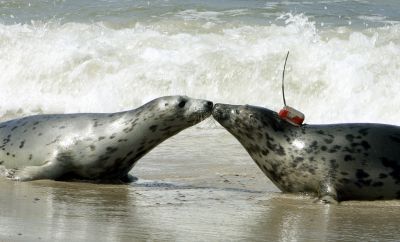Regional leaders working on "miracle" for ailing Baltic Sea

Leaders from Baltic region countries pledged urgent action to generate the "miracle" needed to save one of the world's most polluted seas at a summit in Helsinki Wednesday.
Over-fished, polluted by agricultural nutrient discharge and uncared for, the Baltic is so toxic Greenpeace says pregnant women should not eat its fish.
"We don't expect any miracles, but serious work by all of us which may make a miracle," said Finland's President Tarja Halonen, who co-hosted the summit with Finnish Prime Minister Matti Vanhanen and the Baltic Sea Action Group (BSAG) foundation.
The summit brought together national leadership from 11 countries with a Baltic Sea coast or located in its vicinity - Russia, Sweden, Denmark, Finland Germany, Poland, Estonia, Latvia, Lithuania, Belarus and Norway.
Increasing maritime traffic, over-fishing and eutrophication - the overconcentration of nutrients caused by sewage and agricultural run-off carrying fertilizers into the sea - are key threats to be tackled.
"Actions are needed to make the Baltic Sea healthy, and we have to address these problems by taking care of our national economies and the economies of our neighbours," Russian Prime Minister Vladimir Putin said, adding the sea had "always united" the countries in the region.
His country received praise from participants for its actions to improve waste water treatment in the coastal city of Saint Petersburg.
But most of the meeting focused on the work that lies ahead to save the Baltic, a shallow, semi-enclosed marine environment which is particularly vulnerable to pollution.
Lithuanian President Dalia Grybauskaite said "40,000 tonnes of chemical weapons" polluted the Baltic, and called for help from the United Nations, the European Union, the Organization for Security and Co-operation in Europe (OSCE) and NATO to clean the sea of all weapons.
Numerous ships sunk in World War II also litter the bottom of the brackish body of water, which measures some 450,000 square kilometres (174,000 square miles}, said Finland's Halonen.
Some 90 million people live in countries either bordering the Baltic Sea or with major river tributaries, and Norway's Prime Minister Jens Stoltenberg said 15 percent of the world's cargo traffic already passes through the Baltic.
Increasing shipping heightens the risks of oil and chemical spills, and Stoltenberg called for sustainable growth to secure the environmental and economic future of the region.
Regional leaders confirmed their countries' commitment to reducing the phosphorus and nitrogen flows that have caused eutrophication, and Poland's Deputy Prime Minister Waldemar Pawlak said his country would invest eight billion euros (11 billion dollars) in improving the treatment of waste water.
Researchers say Baltic marine life is being decimated and the World Wildlife Fund (WWF) argues only "radical measures" and a ban on eel fishing could save the species in the Baltic.
The summit also brought together a range of companies and foundations, which had made pledges for measures to save the Baltic ahead of the Helsinki meeting.
Pre-summit commitments include business innovations to recycle nutrients from waste-water and technology to improve communications between vessels and local authorities to enhance safety.
In a speech, Finland's Vanhanen reminded participants of the action that must now be taken.
"The most important day is tomorrow, when we start implementing our commitments," he said.
Subscribe to Independent Premium to bookmark this article
Want to bookmark your favourite articles and stories to read or reference later? Start your Independent Premium subscription today.

Join our commenting forum
Join thought-provoking conversations, follow other Independent readers and see their replies